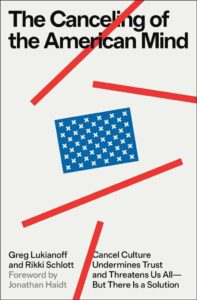 Cancel culture is a prominent, ugly feature of public discourse today, yet many claim it doesn’t exist. They say there are only “consequences,” which amounts to saying that if you’re subjected to abuse because you said something controversial, what else did you expect?
Cancel culture is a prominent, ugly feature of public discourse today, yet many claim it doesn’t exist. They say there are only “consequences,” which amounts to saying that if you’re subjected to abuse because you said something controversial, what else did you expect?
Gangs of goons shout speakers down and claim that doing so is part of the right of “free speech.” By their logic, DDoS attacks on websites and jamming of radio communications are free speech. They shout “Shame! Shame!” as if anyone besides themselves were acting shamefully. They have only one standard: their authority to command others and demand silence from anyone who doesn’t think as they do.
It wasn’t always this way. Threats and demands for punishment of heretics have always been around, and some periods in American history have been full of open violence against opposing views, but the present levels of hostility are the worst in decades. In The Cnceling of the American Mind, Greg Lukanioff and Rikki Schlott document how frequently people on both the right and the left have come to regard anyone who disagrees as an inherently evil person, an enemy to be brought down.
Cancel culture, as the authors use the term, consists of “campaigns to get people fired, disinvited, deplatformed, or otherwise punished for speech that is — or would be — protected by First Amendment standards.” The book examines cancellation from the left and the right, examining the different styles of each.
The first 155 pages are mainly concerned with cancellation from the left, before going into its counterpart on the right. The book makes the case that the majority of cancellation comes from the left, but it’s not a wide majority. Left-style cancellation comes mostly from educational institutions; cancellation from the right tends to originate from politicians, and a big piece of it can be traced directly to Donald Trump.
The authors wanted to show as much cancelation activity as possible, to avoid claims of “a few bad apples.” I would have preferred more depth and context. For instance, they note with alarm that a poll reported that “40 percent of Republicans said committing violence against the government is sometimes justified,” along with “23 percent of Democrats.” But “sometimes” is a broad term, and the Declaration of Independence takes the same position. Interpreting poll answers is tricky, and looking a little more carefully at what they might have meant would have helped.
It’s hard to tell without some context how seriously to take a statement. It can represent an isolated view by a person without much influence, or it can be a nitpick by someone who doesn’t expect anything more than a discussion. With many of the quotes, I couldn’t tell.
The parts that examine specific experiences in more detail are more convincing. We have to wonder how any gang of idiots could get people fired from academic institutions for not caving into pseudo-science such as the denial of biological sex. If ten thousand evangelists demanded the firing of a professor from an Ivy League school for teaching evolution, the administrators would only laugh.
What personally infuriated me the most was the section on the two-bit Stalins who have infiltrated the publishing industry to make big corporations impose tight ideological limits on what may be published. Evidently they envision a future where they’ll be in the top positions, deciding which authors will see print based on whether they sufficiently agree with certain doctrines. In a particularly egregious example, a gang declared that publishing a forthcoming book by Justice Amy Coney Barrett would violate their “right” to dictate what may see print, even though the content of the book wasn’t yet known. It’s odd how little attention this phenomenon got during the latest Banned Books Week.
The explanations which the book offers on the origin of such authoritarian attitudes aren’t entirely convincing to me. The authors suggest that student cancel mobs are the result of training kids to be afraid of everything and encouraging them to give in to their fears. I don’t think this is right. People who are scared try to be quiet and inconspicuous. These are people who believe everyone must submit to their demands, that obedience is their natural right. I admit, though, that I don’t have a good explanation for why this attitude has grown so widespread.
What’s clear is that the liberal consensus has fallen into weakness, if not collapse. We have two gangs, the “Wokes” and the “Magas,” alike in their desire for absolute power but fighting with each other over it. It often seems that the question about our future is only over which gang gets to tear down our freedoms. If Americans who believe in freedom of belief and expression don’t stand up against both of them, America’s future is grim.
The authors call for a “culture of free speech” to counter this trend. That has its problems, though. Much of cancel culture is genuine free speech; calling people fascists or demanding that they be fired is protected by the First Amendment. I’d say rather that what’s needed is a culture of reason. By this I mean that people learn to think with their own minds, reject and avoid making unfounded accusations, and identify nonsense as nonsense. Cancel culture relies on people who accept accusations as proof and demands as moral imperatives. We can’t expect everyone to be equally good at critical thinking, but people who are committed to honest evaluation can get learn to reject obvious nonsense. It’s a tough haul, but it’s where the best chance lies.
The Canceling of the American Mind is published by Simon and Schuster and is available from most booksellers.